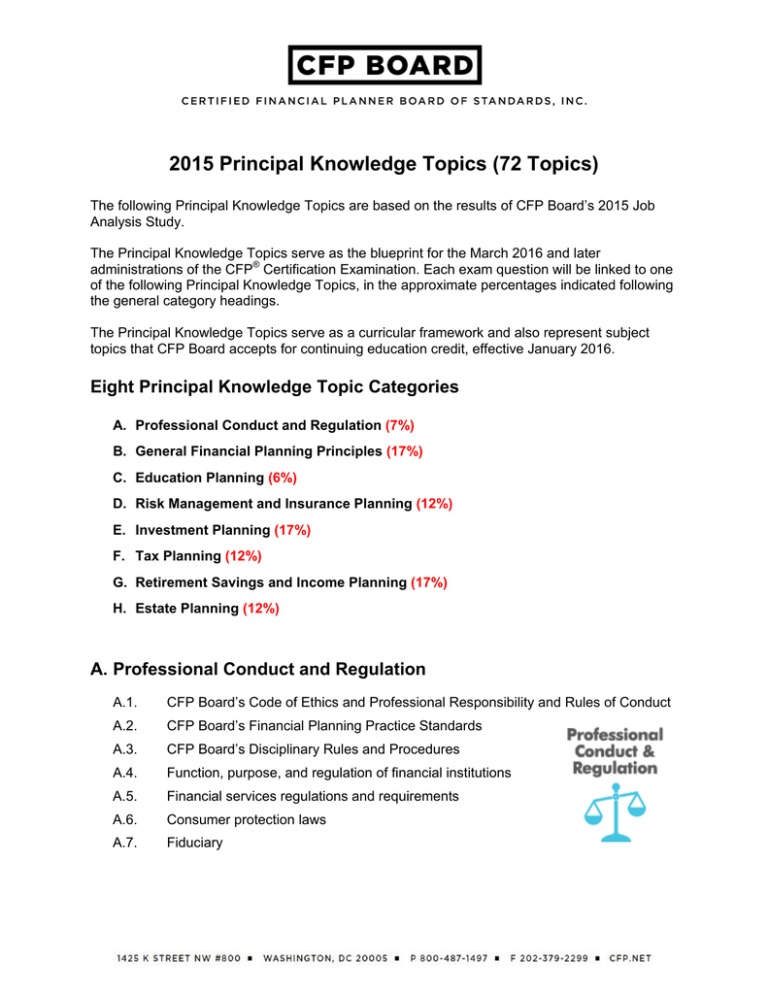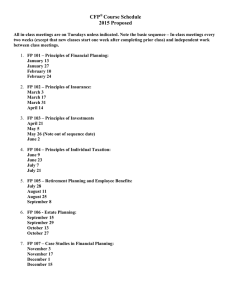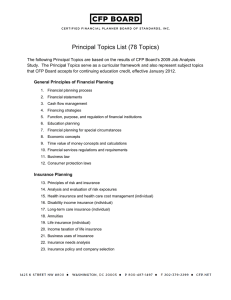
2015 Principal Knowledge Topics (72 Topics)
The following Principal Knowledge Topics are based on the results of CFP Board’s 2015 Job
Analysis Study.
The Principal Knowledge Topics serve as the blueprint for the March 2016 and later
administrations of the CFP® Certification Examination. Each exam question will be linked to one
of the following Principal Knowledge Topics, in the approximate percentages indicated following
the general category headings.
The Principal Knowledge Topics serve as a curricular framework and also represent subject
topics that CFP Board accepts for continuing education credit, effective January 2016.
Eight Principal Knowledge Topic Categories
A. Professional Conduct and Regulation (7%)
B. General Financial Planning Principles (17%)
C. Education Planning (6%)
D. Risk Management and Insurance Planning (12%)
E. Investment Planning (17%)
F. Tax Planning (12%)
G. Retirement Savings and Income Planning (17%)
H. Estate Planning (12%)
A. Professional Conduct and Regulation
A.1.
CFP Board’s Code of Ethics and Professional Responsibility and Rules of Conduct
A.2.
CFP Board’s Financial Planning Practice Standards
A.3.
CFP Board’s Disciplinary Rules and Procedures
A.4.
Function, purpose, and regulation of financial institutions
A.5.
Financial services regulations and requirements
A.6.
Consumer protection laws
A.7.
Fiduciary
CFP Board 2015 Principal Knowledge Topics (cont.)
B. General Principles of Financial Planning
B.8.
Financial planning process
B.9.
Financial statements
B.10.
Cash flow management
B.11.
Financing strategies
B.12.
Economic concepts
B.13.
Time value of money concepts and calculations
B.14.
Client and planner attitudes, values, biases and behavioral finance
B.15.
Principles of communication and counseling
B.16.
Debt management
C. Education Planning
C.17.
Education needs analysis
C.18.
Education savings vehicles
C.19.
Financial aid
C.20.
Gift/income tax strategies
C.21.
Education financing
D. Risk Management and Insurance Planning
D.22.
Principles of risk and insurance
D.23.
Analysis and evaluation of risk exposures
D.24.
Health insurance and health care cost management (individual)
D.25.
Disability income insurance (individual)
D.26.
Long‐term care insurance (individual)
D.27.
Annuities
D.28.
Life insurance (individual)
D.29.
Business uses of insurance
D.30.
Insurance needs analysis
D.31.
Insurance policy and company selection
D.32.
Property and casualty insurance
Page 2 of 5
CFP Board 2015 Principal Knowledge Topics (cont.)
E. Investment Planning
E.33.
Characteristics, uses and taxation of investment vehicles
E.34.
Types of investment risk
E.35.
Quantitative investment concepts
E.36.
Measures of investment returns
E.37.
Asset allocation and portfolio diversification
E.38.
Bond and stock valuation concepts
E.39.
Portfolio development and analysis
E.40.
Investment strategies
E.41.
Alternative investments
F. Tax Planning
F.42.
Fundamental tax law
F.43.
Income tax fundamentals and calculations
F.44.
Characteristics and income taxation of business entities
F.45.
Income taxation of trusts and estates
F.46.
Alternative minimum tax (AMT)
F.47.
Tax reduction/management techniques
F.48.
Tax consequences of property transactions
F.49.
Passive activity and at-risk rules
F.50.
Tax implications of special circumstances
F.51.
Charitable/philanthropic contributions and deductions
G. Retirement Savings and Income Planning
G.52.
Retirement needs analysis
G.53.
Social Security and Medicare
G.54.
Medicaid
G.55.
Types of retirement plans
G.56.
Qualified plan rules and options
G.57.
Other tax-advantaged retirement plans
G.58.
Regulatory considerations
G.59.
Key factors affecting plan selection for businesses
Page 3 of 5
CFP Board 2015 Principal Knowledge Topics (cont.)
G.60.
Distribution rules and taxation
G.61.
Retirement income and distribution strategies
G.62.
Business succession planning
Page 4 of 5
H. Estate Planning
H.63.
Characteristics and consequences of property titling
H.64.
Strategies to transfer property
H.65.
Estate planning documents
H.66.
Gift and estate tax compliance and tax calculation
H.67.
Sources for estate liquidity
H.68.
Types, features, and taxation of trusts
H.69.
Marital deduction
H.70.
Intra-family and other business transfer techniques
H.71.
Postmortem estate planning techniques
H.72.
Estate planning for non-traditional relationships
__________________________________
Contextual Variables
In addition to the Principal Knowledge Topics, other important variables are to be considered
when dealing with specific financial planning situations. These are referred to as “Contextual
Variables” and are used as part of content development for the CFP® Certification Examination
or other case-based scenarios.
More specifically, financial planning situations require the application of financial planning
knowledge for different types of clients. Important client details to consider as part of financial
planning situations are:
•
•
•
•
•
Family Status (traditional family, single parent, same-sex couples, blended families,
widowhood)
Net Worth (ultra-high net worth, high net worth, mass affluent, emerging affluent, mass
market)
Income Level (high, medium, low)
Life or Professional Stage (student, starting a career, career transition, pre-retirement,
retirement)
Other Circumstances (health issues, divorce, change of employment status, aging
parents, special needs children)
CFP Board 2015 Principal Knowledge Topics (cont.)
Copyright © 2015 Certified Financial Planner Board of Standards, Inc. All Rights Reserved
Page 5 of 5







